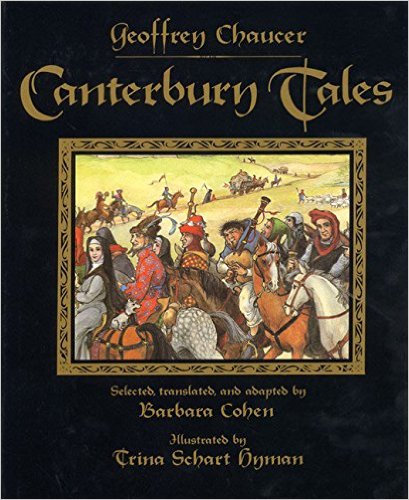What? What did that title just say? Now hold on just a moment! Who the hell does this Ronosaurus Rex think he is anyway, calling the first Great Poet (with a capital G and a capital P) in the English language “a bad poet and a didactic bore”? When I read “The Wife of Bath’s Tale,” for example, I remember delightful comedy, complex poetry and deep insight.
Chaucer greatly expanded the English lexicon employing words “from Greek, Latin, Arabic, German and French – and the following regularly used words: acceptable, altercation, annoyance, arbitration, army, arrogant, arsenic, arc, and aspect” (enotes), and those are just a few of the words beginning with “a.” He introduced the accentual-syllabic metre, the five stress line and the rhymed couplet to the English language. His mixture of comedy and drama, of high and low culture is a hallmark of the best English writing. Without Chaucer, Shakespeare would have been a different writer, nor could he have written his “Troilus and Cressida.” Without Chaucer, there would be no “Faerie Queene” by Edmund Spenser. T. S. Eliot borrowed the first line of “The Waste Land” from Chaucer‘s Canterbury Tales.
Before you get your panties in a knot, consider for a moment who “Chaucer” is. I count at least four Chaucers. There is Chaucer the man. We cannot know him. There is Chaucer, the author, with reputation and status who is studied in English courses, the one I (or you were) discussing in the last paragraph. There is Chaucer, the writer of The Canterbury Tales, a persona, a speaker, invented for the task of writing, as I have invented a persona in order to write this blog (as discussed in Who is Writing This?). And there is Chaucer, the character.
Yes, Chaucer himself is one of the characters traveling on a pilgrimage to Canterbury. (Very metafictional!) When the host asks him to tell his story, we expect poetry at least as grand as all that his come before, since it was Chaucer who wrot e it, and yet the romance he gives (a romance being the story of a knight-errant) is sing-song and childish. The lines are short, the rhymes are simple: “Listeth, lordes, in good entent / And I wol telle verrayment / Of myrthe and of solas; / Al of a knyght was fair and gent / In bataille and in tourneyment, / His name was sire Thopas” (383) and his gives us endless lists of uninteresting details.
The host interrupts him and says, “Namoore of this, for Goddes dignitee / . . . for thous makest me / So wery of thy verray lewednesse / That, also wisly God my soule blesse, / Myne eres aken of thy drasty speche. / Now swich a rym the devel I biteche! / This may wel by rym dogerel,’ quod he” (389). The free online dictionary define doggerel as “Crudely or irregularly fashioned verse, often of a humorous or burlesque nature.”
What can this mean? Chaucer’s creation is interrupting Chaucer and accusing him of the lowest kind of poetry. How can this be? The host then asks for something in prose and Chaucer launches into the “Tale of Melibee,” which starts, interestingly enough, with the title character’s enemies breaking into his home, beats his wife and attacks his daughter.
Melibee then calls a conference with many so-called friends to discuss what he should do. Most advise war, but his wife launches into a very lengthy debate full of many dull quotations arguing for peace. In fact, it is so long and boring, I confess I did not finish it.
What is Chaucer’s point? Chaucer is making clear to us that the character Chaucer is not the poet who put together The Canterbury Tales, and by extension we might add that the speaker throughout the Tales is not the real Chaucher either, nor is the real Chaucer the Chaucer we have come to know in our culture. The character is a metafictional reminder that all authors create characters of themselves, so don’t take that character, that speaker too seriously.
Chaucer, by the way, borrowed the structure of The Decameron for his own masterpiece. The plot of A Knight’s Tale comes from Boccaccio’s “The Teseide” and about a third of “Troilus and Criseyde” from “The Filostrato.” (You can read about The Decameron in my post, The Decameron With and Without a Frame.)
Chaucer, Geoffrey. Canterbury Tales. London: Everyman’s Library, 1958.

Nice brief and this fill someone in on helped me alot in my college assignement. Gratefulness you as your information.
My name is Piter Jankovich. oOnly want to tell, that your blog is really cool
And want to ask you: is this blog your hobby?
P.S. Sorry for my bad english
Good dispatch and this fill someone in on helped me alot in my college assignement. Thank you for your information.
Date Hello, I have browsed most of your posts. This post is probably where I got the most useful information for my research. Thanks for posting, maybe we can see more on this. Are you aware of any other websites on this subject